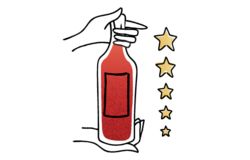Investment wines, exempt from Capital Gains Tax, are even more valuable to investors and current prices are too good to miss.
Why must investors consider fine wine post the Budget?
- Fine wine is a Capital Gains Tax-exempt asset
- Investors can buy for growth now at the market low point
- Fine wine is a liquid asset in an established secondary market
- Long-term history of strong growth
Rachel Reeve’s tax overhaul announced in the recent Budget delivered a clear signal to investors that portfolios should include CGT exempt assets to be managed more tax efficiently to deliver the best returns.
There was no surprise that CGT (Capital Gains Tax) was going to be one of Ms Reeve’s key tax levers and the increase for lower band taxpayers from 10% to 18% and higher rate 20% to 24%, with immediate effect at 30th October, grabbed the headlines.
 These changes, combined with the former Chancellor, Jeremy Hunt’s reduction of the CGT allowance from £12,000 to £3,000 a year, mean that even smaller investors in shares may now get caught by CGT and they will pay more.
These changes, combined with the former Chancellor, Jeremy Hunt’s reduction of the CGT allowance from £12,000 to £3,000 a year, mean that even smaller investors in shares may now get caught by CGT and they will pay more.
Investment in equities and property are the primary targets for the Treasury, but CGT also applies to profits made on the sale of personal possessions such as jewellery, paintings, antiques, coins and stamps, and sets of things, for example matching vases. It’s worth noting that a gift to your spouse should be exempt.
It’s now more important than ever that investors are strategic about wealth management to minimise the impact of tax. Wrappers such as ISAs and pension allowances may help some, but including exempt assets is an important option.
Which assets are CGT exempt?
Traditionally, and perhaps the best-known exempt investments include Government Bonds in the UK. But certain tangible assets are classified by HMRC as ‘Wasting Assets’, as they are not expected to last more than 50 years are exempt.
CGT exempt assets:
 - Fine wine
- Fine wine
- - Watches
- - Cars (not used for business purposes)
- - Whisky in cask (whisky in-bottle attracts CGT)
We review these assets as luxury investments periodically and fine wine is consistently one of the top performers.
Fine wine market conditions and why investors should act now
I called the market low in September, stating that Q4 2024 was the key time for wine investors – was I right? The October data reveals:
- Trade on Liv-ex, the fine wine stock exchange surged over 20% in October 2024
- The Liv-ex 100 exceeded the FTSE 100 for the first time in 12 months in October
- Record number of unique wines were traded on Liv-ex in October, up 8% on September’s previous record level
- For more data, see our November 2024 Market Report
Source: Liv-ex.com, November 2024
The fact that gains made from investment wines are generally CGT exempt is compelling enough to consider adding fine wine to your portfolio, but combine this with the current state of the market. Fine wine has completed a two-year price correction with lower levels now attracting a surge in trade in the secondary market.
Act now to position for tax-free growth.
We recommend that all investors seek specialist tax advice. For more information on investing fine wine and the current market trends, see our latest reports and speak to a member of our expert team on 0203 384 2262.

